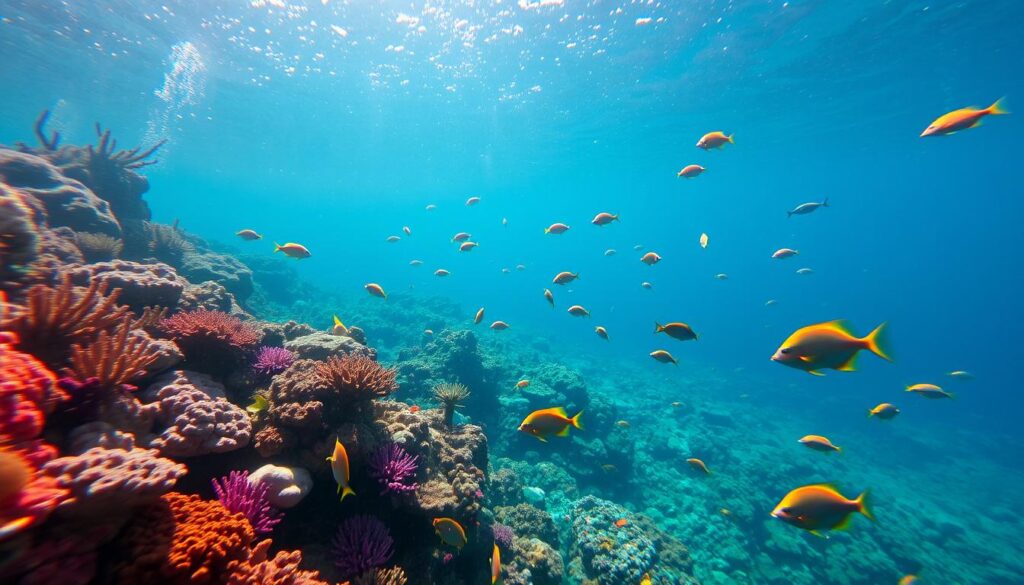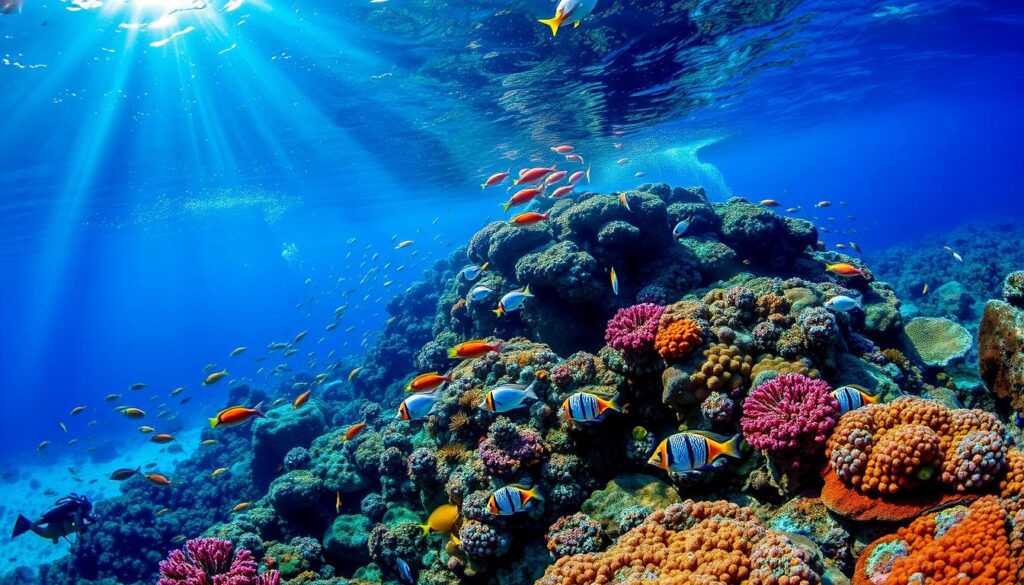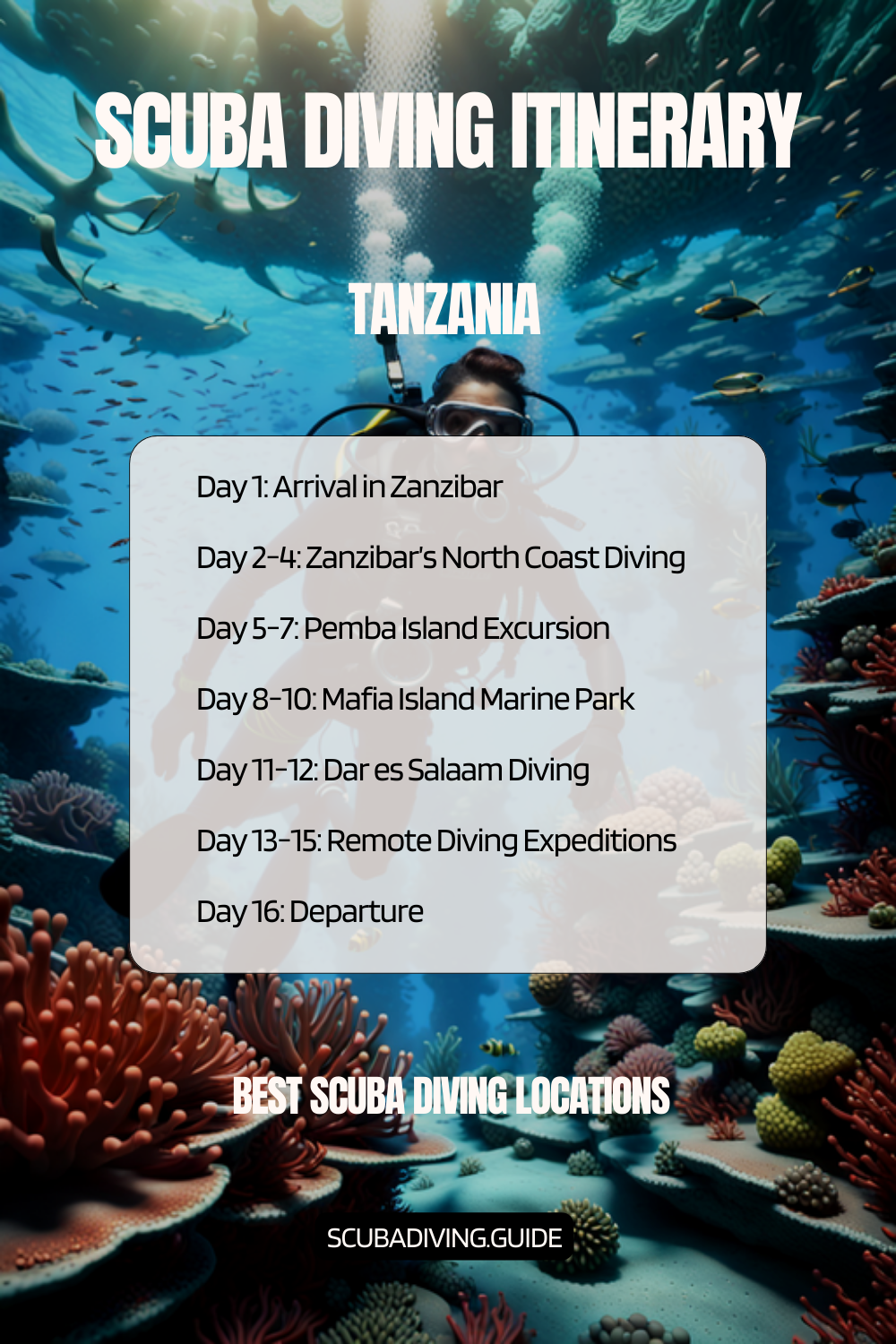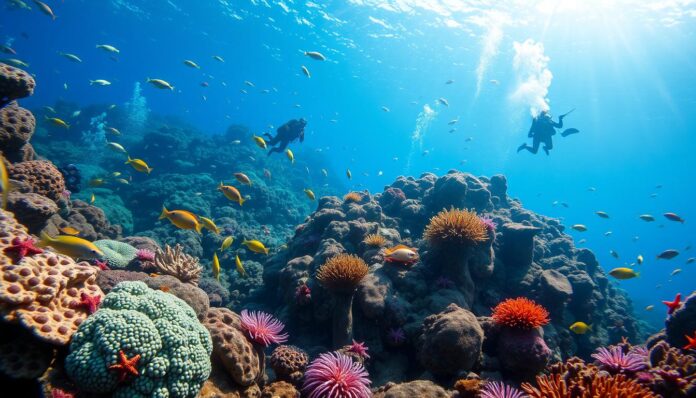| Best Time to Travel | March to May, October to December |
| What to Expect | Warm water, clear visibility, diverse marine life |
| Diving Conditions | Year-round, but best from March to May and October to December |
| Marine Life | Whale sharks, manta rays, turtles, sharks, dolphins, fish |
Have you ever wondered what secrets lie beneath the crystal-clear waters of the Indian Ocean? Tanzania offers an underwater paradise that beckons adventurers and marine enthusiasts to explore its breathtaking underwater world.
Scuba diving in Tanzania presents an unparalleled opportunity to discover a marine wonderland that few have experienced. From the vibrant coral reefs of Zanzibar to the pristine waters of Pemba Island, this East African destination promises an extraordinary underwater journey for divers of all skill levels.
With water temperatures ranging from 25 to 29 degrees Celsius and visibility reaching up to 30 meters, Tanzania underwater exploration offers an incredible diving experience. Whether you’re a beginner or an experienced diver, the region’s diverse marine ecosystems provide an unforgettable adventure.
Key Takeaways – Scuba Diving in Tanzania
- Ideal diving conditions with warm waters and excellent visibility
- Suitable for divers aged 10 and older
- Multiple dive sites including Zanzibar and Pemba Island
- Typical dive experiences lasting 30-50 minutes
- Best diving months are June to October and December to February
- Complimentary offerings including gear rental and free snorkeling
- Affordable diving packages starting at 120 USD

Introduction to Scuba Diving in Tanzania
Tanzania’s coastline along the Indian Ocean is home to an amazing underwater world. Scuba diving here offers a chance to see rich marine life in clear waters. It’s a unique experience that draws divers from everywhere.
The underwater world of Tanzania is a treasure for those who love the sea. Its long coastline and many islands make it perfect for exploring. This attracts divers from all over the world.
Overview of the Tanzanian Dive Scene
Tanzania’s dive scene is incredibly diverse. It has many amazing places to dive:
- Zanzibar Archipelago: A famous diving spot
- Mafia Island: A marine park with lots of marine life
- Pemba Island: For advanced divers with strong currents
- Lake Tanganyika: A unique place for freshwater diving
Importance of Marine Conservation
“Protecting our marine ecosystems is not just a responsibility, it’s a necessity for future generations of divers.”
Tanzania is serious about saving its marine life. Places like Mafia Island Marine Park have been protected for over 15 years. This shows the country’s commitment to keeping the sea healthy.
Best Time to Dive in Tanzania
Knowing when to dive is key for a great experience. The water is always between 78-85°F, making it perfect for diving all year.
| Season | Diving Conditions |
|---|---|
| October-March | Peak diving season, excellent visibility |
| April-September | Rainy season, reduced visibility |
Professional divers say the best time to dive in Tanzania is during the dry season. This is when the sea is calm and you can see everything clearly.
Top Scuba Diving Destinations in Tanzania
Tanzania is a paradise for divers. It has everything from beautiful coral reefs to lively marine life. The diving spots here offer amazing ocean adventures.
PADI-Approved Dive Sites
Scuba lovers will find top-notch diving spots in Zanzibar. These sites are perfect for all skill levels. They offer incredible underwater views:
- Mnemba Atoll Dive Spots: Known as the tropical fish capital of East Africa
- Pemba Island Scuba Adventures: Featuring visibility up to 40 meters
- Mafia Island Marine Park: Home to 200 resident whale sharks
Best Locations for Beginners and Pros
There are dive sites for everyone. Zanzibar’s sheltered bays are great for beginners. For experts, Leven Bank offers strong currents.
“The underwater world of Tanzania is a treasure waiting to be discovered by divers of all experiences.” – Marine Exploration Journal
Hidden Gems: Lesser-Known Dive Spots
Tanzania has special diving spots too. Mesali Island Coral Garden is a must-see. It’s full of coral species, and you can see turtles, rays, and eels.
| Location | Visibility | Best Season |
|---|---|---|
| Mnemba Atoll | 20-60 meters | November-March |
| Pemba Island | 30-40 meters | July-March |
| Mafia Island | 4-30 meters | October-March |
Every dive site is unique. They offer a chance to explore Tanzania’s amazing underwater world.
The Vibrant Marine Life of Tanzania
Dive into the breathtaking underwater world of the Marine Life of Tanzanian Coast. Here, the Indian Ocean shows a spectacular ecosystem full of marine biodiversity. Coral Reef Diving Tanzania takes you on an extraordinary journey through some of the most pristine and vibrant underwater landscapes on the planet.

Tanzania’s coastal waters stretch over 1,400 kilometers, creating a marine paradise. This paradise captivates divers and marine enthusiasts from around the globe. The region’s unique underwater environments provide a stunning backdrop for exploring marine ecosystems.
Coral Reefs and Ecosystems
The coral reefs along Tanzania’s coastline are some of the most diverse and healthy in the Indian Ocean. Key marine sanctuaries include:
- Mnemba Atoll: Known for exceptional water visibility
- Mafia Island Marine Park: Featuring pristine coral gardens
- Chumbe Island Coral Park: A fully protected reef sanctuary
Popular Species to Spot Underwater
Divers can expect remarkable marine encounters with a variety of species, including:
| Marine Species Category | Common Encounters |
|---|---|
| Fish Species | Angelfish, Butterflyfish, Clownfish, Parrotfish |
| Large Marine Animals | Whale Sharks, Hawksbill Turtles, Green Turtles |
| Predatory Fish | Barracudas, Groupers, Snappers |
Unique Biodiversity in Tanzanian Waters
The Indian Ocean’s dynamic currents create a marine hotspot that supports exceptional biodiversity. Diving opportunities range from vibrant coral reefs to dramatic underwater landscapes. These offer experiences for both novice and experienced divers.
“Tanzania’s underwater world is a kaleidoscope of colors and life forms, making it a haven for marine enthusiasts.” – Marine Exploration Journal
Essential Scuba Gear and Equipment
Getting ready for scuba diving in Tanzania means picking the right gear. It doesn’t matter if you’re new or have lots of experience. Knowing what you need makes diving safe and fun.
Recommended Gear for Beginners
New divers in Tanzania should focus on a few key items:
- Mask: A good fit is key for clear vision underwater
- Fins: Pick between full-foot or open-heel based on the water
- Wetsuit: Choose the right thickness for Tanzania’s waters
- Buoyancy Compensator Device (BCD): It helps control your movement underwater
Renting vs. Buying Scuba Equipment
In Tanzania, you have many options for scuba gear. Many dive centers have top-notch rental gear. This is a great choice for travelers.
| Renting | Buying |
|---|---|
| Cost-effective for occasional divers | Long-term investment for frequent divers |
| No maintenance required | Personalized equipment fit |
| Latest gear available | Consistent comfort and familiarity |
Safety Gear: What You Need
Safety is key when diving in Tanzania. You’ll need:
- Surface Marker Buoy (SMB)
- Dive computer
- Emergency signaling devices
- Dive knife or multi-tool
“The right gear transforms a good dive into an extraordinary underwater experience.” – Tanzanian Dive Expert
Pro tip: Always check your gear before diving and keep it in good shape for a safe dive in Tanzania.
Certification and Training for Scuba Diving
Scuba diving in Tanzania is a journey of skill and marine exploration. Knowing the certification process is key for diving into Tanzania’s stunning waters.
Diving certifications teach essential underwater skills. They range from beginner to advanced levels. Each ensures safety and boosts your underwater experience in Tanzania.
Overview of Scuba Certification Levels
PADI certification levels guide divers through a structured learning path:
- Open Water Diver: Entry-level certification
- Duration: 3-4 days
- Maximum depth: 18 meters
- Minimum age: 10 years
- Advanced Open Water Diver: Intermediate level
- Duration: 2-3 days
- Maximum depth: 30 meters
- Required adventure dives: 2-5
Best Dive Schools in Tanzania
Tanzania has top-notch dive schools in Zanzibar and Pemba Island. These schools provide excellent training and certification programs.
| Location | Open Water Certification Cost | Practical Part Cost |
|---|---|---|
| Zanzibar | $500 | $370 |
| Pemba Island | $550 | $400 |
Tips for Choosing the Right Course
When picking a scuba diving course in Tanzania, consider these factors:
- Current skill level
- Personal diving goals
- Available time commitment
- Instructor’s experience
- School’s safety record
“The underwater world of Tanzania offers a transformative experience for divers of all levels.” – Local Diving Instructor
Scuba diving in Tanzania needs proper training and certification. By choosing the right course and school, you’ll have an unforgettable underwater adventure in a world-class marine environment.
Guided Diving Tours and Packages
Exploring Tanzania’s underwater world needs expert guides and special diving experiences. Tanzania Underwater Exploration offers a chance to see the marine treasures beneath the waves.

Dive fans can pick from many exciting packages. These tours are made for different skill levels and tastes. They offer unforgettable underwater adventures in some of the world’s most beautiful marine spots.
What to Expect on a Guided Tour
- Professional PADI-certified dive masters
- Comprehensive safety briefings
- Access to prime diving locations
- High-quality equipment provided
Popular Diving Packages
Mafia Island Dive Safaris offer amazing underwater experiences. Their packages include:
- 8-day expedition priced at $4,629 per person
- 6 total diving days with 2 dives daily
- Meals included: 7 breakfasts, 2 lunches, 6 dinners
Private vs. Group Diving Experiences
Divers can choose between private tours or group dives. Private tours give you personal attention. Group dives are cheaper and great for meeting others who love diving.
“The ocean stirs the heart, inspires the imagination and brings eternal joy to the soul.” – Robert Wyland
Diving in Tanzania is amazing, with water temperatures from 75 to 80°F. Visibility can be up to 50-60 feet. The best diving months are from October to April, when you can see whale sharks.
| Dive Package Feature | Details |
|---|---|
| Base Package Cost | $160 for 2 dives |
| Equipment Rental | $30 per day |
| Park Entry Fee | $30 for Mnemba Atoll |
Whether you’re new to diving or have lots of experience, Tanzania’s underwater world is a journey of discovery and wonder.
Safety Precautions for Scuba Divers
Scuba diving in Tanzania is an amazing adventure. But, safety is always first. Divers need to be ready and aware to enjoy the beautiful sea.
Before you dive, there are important safety steps to take. These steps will make your dive safe and fun.
Understanding Possible Risks
Scuba diving has risks that divers must know. The main dangers are:
- Decompression sickness
- Equipment failure
- Encounters with sea creatures
- Challenges due to physical fitness
Essential Safety Tips for Beginners
If you’re new to diving in Tanzania, follow these basic safety tips:
- Get a medical check-up before diving
- Dive with a certified buddy
- Practice good buoyancy control
- Check your gear before diving
“Plan your dive, dive your plan” – A key safety rule for diving.
First Aid and Emergency Procedures
Knowing how to handle emergencies is vital for diving in Tanzania. Important steps include:
- Spot signs of diving-related health issues
- Learn basic first aid
- Find the nearest hyperbaric chamber
- Have emergency contact info
Being prepared can turn risks into manageable challenges on your Tanzanian diving trip.
Environmental Responsibility and Sustainable Diving
Coral Reef Diving Tanzania is all about caring for the sea. Divers are key in keeping the underwater world safe. Tanzania’s coral reefs are home to over 1,500 fish species, making them a vital place to protect.
Preserving Coral Reefs: A Diver’s Duty
Understanding the sea’s fragility is the first step. Divers in Tanzania’s reefs must follow certain rules:
- Maintain perfect buoyancy control
- Never touch or disturb marine life
- Use reef-safe sunscreen
- Avoid anchoring near sensitive coral formations
Reducing Plastic Waste While Diving
Plastic pollution harms the sea. Divers can help by following simple steps:
- Carry reusable water bottles
- Minimize single-use plastic consumption
- Participate in underwater and beach clean-up initiatives
Participating in Conservation Programs
Coral Reef Diving Tanzania lets you join in marine conservation. Local dive centers have programs that help protect the sea:
| Conservation Initiative | Impact |
|---|---|
| Coral Restoration Projects | Rebuilding damaged reef ecosystems |
| Marine Life Surveys | Tracking biodiversity and population changes |
| Community Education Programs | Raising awareness about marine conservation |
“Every dive is an opportunity to protect our planet’s most precious underwater environments.” – Marine Conservation Expert
By embracing sustainable diving practices, we ensure that future generations can experience the breathtaking beauty of Tanzania’s marine ecosystems.
Cultural Insights into Tanzanian Diving
Tanzania Underwater Exploration is more than just amazing sea views. It opens a window into the rich coastal culture. This culture has shaped maritime traditions for many years. Diving here is a deep cultural experience, beyond just the underwater world.
The coastal areas of Tanzania have strong ties between local people and the sea. Divers get to see traditional practices that have helped these communities for centuries.
Local Diving Communities
Tanzania’s diving communities mix old knowledge with new marine conservation. They have learned a lot about the ocean over many years.
- Generations of pearl diving traditions
- Sustainable fishing practices
- Deep respect for marine ecosystems
Interaction with Indigenous Fishermen
Talking to local fishermen gives great insights into Tanzania Underwater Exploration. These talks show old fishing ways and deep ocean connections.
“The sea is our life, our history, our future.” – Local Tanzanian Fisherman
Respecting Marine Life and Local Traditions
Being culturally sensitive is key to diving responsibly. Many coastal communities in Tanzania believe the sea is sacred. Knowing these beliefs helps divers connect more deeply with the underwater world.
- Learn local marine conservation practices
- Understand traditional oceanic beliefs
- Participate in community-led conservation efforts
By embracing cultural understanding, divers can turn their underwater experience into a deep journey of discovery and respect.
Travel Information: Getting to Tanzania
Planning your scuba diving trip to Tanzania needs careful thought and knowledge of travel details. The trip involves choosing the right transportation and meeting entry needs. These steps will prepare you for an amazing underwater journey.
Visa Requirements and Travel Tips
Before diving into Tanzania, know the entry rules. Most visitors can get a visa when they arrive or online. Here are some travel tips:
- Make sure your passport is valid for at least six months after your trip
- Get the needed vaccinations before you leave
- Bring proof of yellow fever vaccination
- Exchange money at official banks or approved places
Best Airlines and Routes
Choosing the right flight is key for your diving trip. Tanzania has three main airports for travelers:
- Julius Nyerere International Airport (DAR) in Dar es Salaam
- Kilimanjaro International Airport
- Zanzibar International Airport
“Tanzania offers world-class diving experiences with multiple convenient entry points for international travelers.”
Local Transportation Options
Once in Tanzania, divers have many ways to get to their dive spots:
- Domestic flights between major cities
- Ferries for coastal areas
- Private transfers and shuttle services
- Rental cars for exploring on your own
The trip from New York to Tanzania takes about 18 hours, including layovers. Spending around $1,500 for diving in Tanzania is a great deal for those eager to explore the sea.
Accommodation Options
Diving enthusiasts will find a wide range of places to stay in Tanzania’s coastal areas. You can choose from luxury resorts to budget hotels. Hotels like Zanzibar White Sand Luxury Villas & Spa and Riu Palace Zanzibar offer top-notch stays. Prices range from $270 to $669 per night, with guest ratings over 9.0 out of 10.
For those on a budget, 3-star hotels start at $79, like the Zan View Hotel. Most places have great amenities like outdoor pools and restaurants. They also offer direct access to diving and snorkeling. Plus, there are activities like fishing and horse riding for more fun.
Some lodges are PADI-certified dive centers. They offer dive packages with multiple dives and marine park access. With water at 26°C and visibility up to 30 meters, diving in Tanzania is unforgettable.
Pro tip: Book from September to March for the best diving conditions. Check hotel amenities and dive site locations for the best underwater adventure.
Tanzania Recommended Scuba Diving Itinerary
To make the most of your scuba diving adventure in Tanzania, it’s essential to plan a well-rounded itinerary that allows you to explore the diverse underwater landscapes and marine life. Here’s a recommended itinerary that combines some of the best diving locations in Tanzania:
Day 1: Arrival in Zanzibar
Arrive at the Zanzibar International Airport and transfer to your chosen accommodation. Take the day to relax, acclimatize, and explore the vibrant culture and historical charm of Stone Town, a UNESCO World Heritage Site.
Day 2-4: Zanzibar’s North Coast Diving
Start your diving journey by exploring the dive sites along Zanzibar’s North Coast. Dive at Kendwa Reef, Nungwi Reef, and Mnemba Island, known for their vibrant coral gardens and diverse marine life. Enjoy encounters with sea turtles, tropical fish, and the occasional sighting of dolphins.
Day 5-7: Pemba Island Excursion
Take a short flight or boat ride to Pemba Island, where you’ll embark on a diving adventure in this unspoiled diving paradise. Dive at Misali Island Marine Conservation Area and explore the dramatic drop-offs and underwater pinnacles. Encounter rare species such as the Pemba Flying Fox and immerse yourself in the untouched beauty of Pemba’s reefs.
Day 8-10: Mafia Island Marine Park
Fly from Pemba Island to Mafia Island, where you’ll spend the next few days exploring the pristine waters of Mafia Island Marine Park. Dive along the coral walls, discover hidden caves, and witness the majesty of whale sharks and manta rays. Mafia Island offers a tranquil and biodiverse underwater experience that should not be missed.
Day 11-12: Dar es Salaam Diving
Travel back to the mainland and head to Dar es Salaam, where you can enjoy diving at the nearby marine reserves of Bongoyo Island and Mbudya Island. These sites offer excellent visibility, colorful coral formations, and the opportunity to encounter reef sharks and a variety of marine species.
Day 13-15: Remote Diving Expeditions
Embark on a remote diving expedition to explore secluded areas along the Tanzanian coastline. Join a liveaboard or diving center that offers specialized trips to hidden coves, untouched reefs, and marine reserves off the beaten path. Immerse yourself in the serenity of these unexplored dive sites and marvel at the abundance of marine life.
Day 16: Departure
Conclude your scuba diving adventure in Tanzania and depart from the Zanzibar International Airport or Dar es Salaam International Airport with unforgettable memories of your underwater explorations.
It’s important to note that this itinerary is just a suggestion and can be customized based on your preferences, time constraints, and diving experience. Diving conditions, such as visibility and currents, may vary throughout the year, so it’s advisable to plan your trip during the optimal diving season for each location.
Always ensure that you dive within your certification limits and follow the guidance of experienced dive professionals. Respect the marine environment, practice responsible diving, and leave only bubbles behind.
With this recommended itinerary, you’ll have the opportunity to dive in some of the most remarkable locations in Tanzania, discovering the rich biodiversity and captivating underwater landscapes that make this country a top destination for scuba diving enthusiasts.

Other Countries to Consider
FAQ – Scuba Diving in Tanzania
What are the best months for scuba diving in Tanzania?
The best time to dive is from June to October. This period has clear waters and calm seas. But, check the specific area you plan to dive in for the best conditions.
Do I need a specific certification to dive in Tanzania?
You should have a basic Open Water Certification. But, many dive centers offer courses for beginners. They also have programs for advanced divers to explore Pemba Island and Mafia Island.
What marine life can I expect to see while diving in Tanzania?
Tanzania’s waters are full of marine life. You can see sea turtles, whale sharks, colorful fish, dolphins, and sharks. Mnemba Atoll and Mafia Island are known for their amazing marine life.
Is it better to bring my own diving equipment or rent locally?
Dive centers in Tanzania have good rental equipment. But, experienced divers might prefer their own gear. Think about what’s most comfortable for you when deciding.
What are the top diving destinations in Tanzania?
Zanzibar, Pemba Island, and Mafia Island are the best places to dive. Each offers unique underwater experiences, from beautiful coral reefs to large marine species.
Are there conservation programs I can participate in while diving?
Yes! Many dive centers in Tanzania have marine conservation programs. You can help with coral restoration, marine life surveys, and community education. These programs help protect the marine ecosystem.
What safety precautions should I take while diving in Tanzania?
Always dive with a certified instructor. Follow local guidelines and keep your buoyancy control. Check your equipment and stick to safe depths. Dive centers provide safety briefings before each dive.
Do I need special travel documents to dive in Tanzania?
You’ll need a valid passport and a tourist visa. You can get the visa on arrival or through an e-visa. Some dive centers might ask for your dive certification and travel insurance.
What is the water temperature like for diving in Tanzania?
The water temperature is between 26-29°C (79-84°F) all year. This makes diving comfortable without a thick wetsuit. A 3mm wetsuit is usually enough.
Can beginners find suitable diving experiences in Tanzania?
Yes! Zanzibar has many safe bays and shallow reefs for beginners. Dive centers offer courses and guided dives for new divers.
